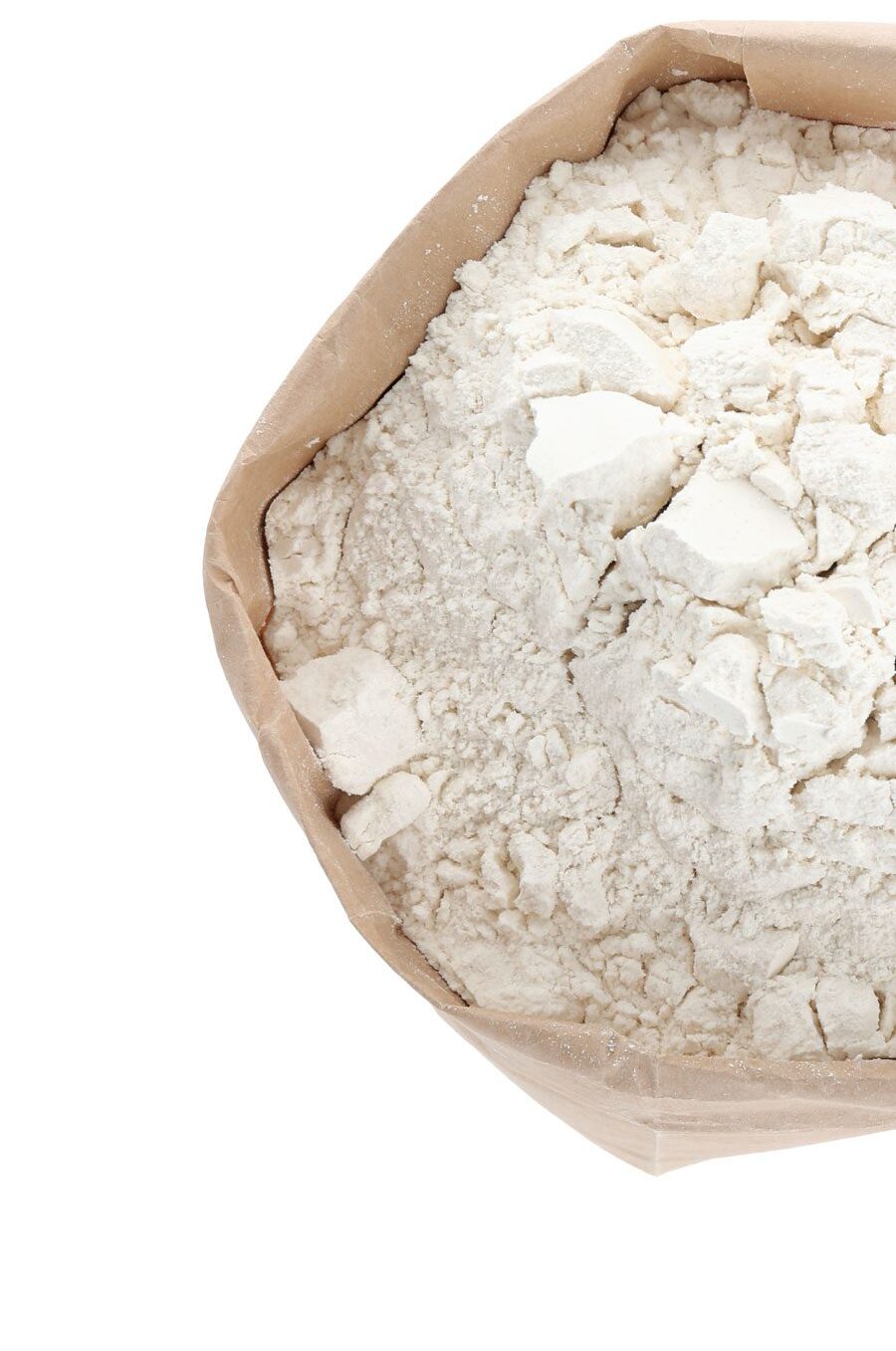Table of Contents
Table of Contents
Foreword
from Fedima's president
Johan Sanders,
President of Fedima
Dear members, dear readers,
I am delighted to present to you Fedima’s 2022-2023 Annual Report, in which you will find an overview of our main accomplishments of the past year as well as insights into our daily activities and a preview of what’s in the pipeline in the coming months.
This past year, marked by supply chain challenges and the consequences of growing inflation, reminded us that we are the strongest when we face difficult times together, relying on the sense of community and collaboration between our members. More than ever, we have been working to further strengthen our community, and we are looking forward to bringing it together in person at Fedima’s General Assembly in Sevilla, Spain. This year’s accomplishments would not have been possible without the continuous support of our members, and I would like to use these few words to thank them for their loyalty and enthusiasm towards Fedima and our mission to reinforce the position of our industry in Europe.
First and foremost, I am proud to showcase how Fedima continues to take concrete steps in promoting a common sustainability ambition across the value chain. We believe that Fedima can have an even bigger role in pushing all industry players towards more sustainable practices, and we are committed to placing the resilience and sustainability of the sector as an overarching and guiding theme reflected in all our activities, with a joint effort from each of Fedima’s workstreams. Our Sustainability Committee, supported by the other Committees and by our members, has been driving concrete projects such as the development of a code of conduct for responsible sourcing and the upcoming Fedima Grant in support of local sustainability initiatives, which I invite you to read more about in the coming pages.
Moreover, it is Fedima’s role to safeguard the needs of its members in light of growing EU regulatory developments that may impact them. For this reason, we have been focusing on strengthening the voice and defending the interests of the sector by participating in the discussions on current key regulatory topics such as the upcoming EU front-of-pack nutrition labelling system, aiming to reach a positive legislative, regulatory, and political framework and ensure the next mandate brings opportunities for the sector.
I hope you enjoy reading our Annual Report, the result of our Association’s hard work during the past year, which provided our industry with plenty of learning opportunities, despite the challenges.
Lastly, let me invite you to also read Fedima’s contribution to the 2023 Baking Europe Ingredients Market (BEIM) Report, published by Media Energy Ltd in October 2023. It includes a focus on the implications of the EU Deforestation Regulation on the sustainable development of our sector, a piece on front-of-pack nutrition labelling, and an insight into marketing practices in the bakery industry.
Happy reading and thank you for your interest in Fedima!
Fedima at a glance
Who we are
Fedima is the federation of European manufacturers and suppliers of ingredients to the bakery, confectionery, and patisserie industries. The Association represents the interests of more than 26,000 direct employees across Europe. Fedima’s membership comprises national associations in 13 European countries and represents around 200 companies across Europe.
Fedima engages at EU level on policy issues of relevance to the bakery and pastry ingredients industry, ensuring its members’ needs are heard. The Association aims to secure access to a single European market for its members and to facilitate their business activities within the European Union.
To shape a favourable environment to ensure a sustainable and innovative bakery sector
To be the European bakery ingredients platform to support and grow the bread and pastry market
Since its founding over 50 years ago, Fedima has contributed to the market's growth by engaging with decision-makers to help shape sustainable regulation and public policies. In times where customers are increasingly interested in the origin of the food they consume, and how this food is made, the Association has focused its efforts on informing the public about baked goods products’ ingredients. Fedima also focuses on ensuring that the sector continuously grows and adapts to changing realities, responding to specific topics and issues that arise with agility. The Association works to provide clear, credible responses to market or political challenges, establishing its position on the European and global stage.
Fedima is also a part of several groups which aim to address specific issues in the broader industry. By working alongside other associations and industry players, Fedima can expand its position in the sector and provide a valuable contribution to discussions and decisions on topics of common interest.
Fedima history
1957
The newly formed European Economic Community begins raising food quality standards across Europe, and very prudently puts forwards the first directives in the 1960s, which the food sector and business leaders in the bakery ingredients’ sector follow closely.
1969
20 May, Milan (Italy): The founding meeting establishes the birth of Fedima - the Federation of European Manufacturers and Suppliers of Ingredients to the Bakery, Confectionery and Patisserie Industries. Fedima started with five founding national associations and quickly grew by welcoming new members in parallel with the European Union’s enlargement. The President chaired annual meetings to discuss key business. Annual meetings were held on a rotation basis in every Fedima member’s country.
1970s
The first Food Labelling Directive and further laws and regulations regarding the food safety protection of European consumers are passed.
1985
Fedima moves its Secretariat to Brussels, closer to the European institutions.
2000s
Fedima focuses on consolidating progress towards a full single market.
2019
It’s Fedima's 50th anniversary! To celebrate, we hosted a stakeholder event in Brussels, attended by EU officials and representatives of various Brussels-based trade associations.
What we do
To actively support our members and, in turn, their members, Fedima takes decisive action in four fields:
Market
Knowledge
Gathering and sharing data and information about Fedima’s market and the principal categories of interest, with the aim of better understanding any developments in the sector.
Regulatory & Legislative Affairs
Becoming a key knowledge partner for regulatory bodies, offering positions on main policy areas.
Value
Creation
Promoting Fedima’s position in the value chain and establishing connections across the industry.
Reputation
Building
Increasing internal and external awareness of Fedima’s activities, expanding influence in relevant sectors, and working towards being a leader in the industry.

We work to address multiple interrelated subjects of interest with the ultimate aim of further developing trust and reputation, increasing stakeholder engagement and member participation in relevant areas, and establishing the Association as a thought leader in the sector.
This multi-faceted structure helps Fedima maintain consistent activity on a variety of topics at the same time and drive forward the Association’s priorities.
How Fedima is structured
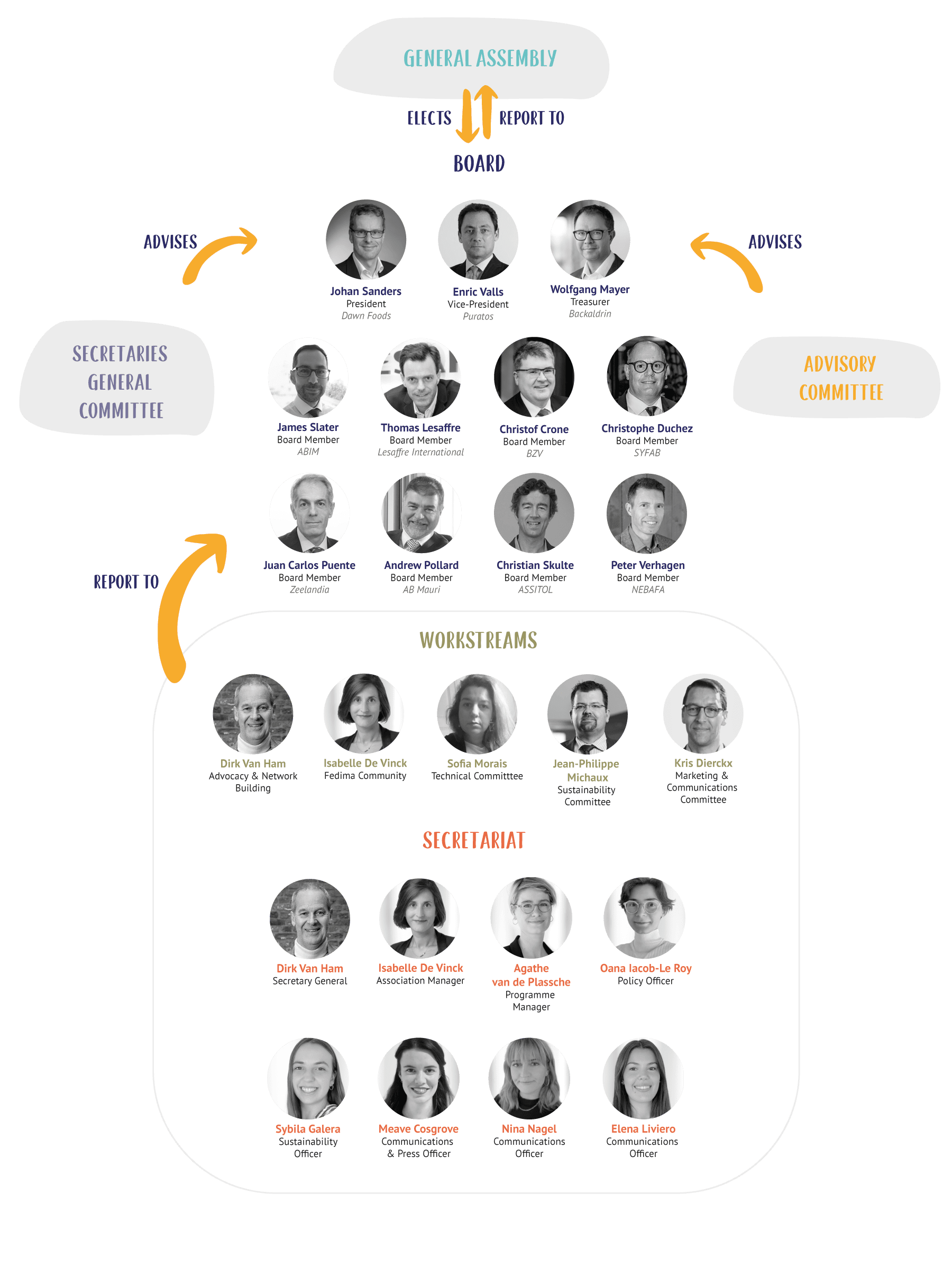
Government
The General Assembly is the highest governing body composed of all 13 member National Associations. The General Assembly can bring modifications to Fedima’s Statutes and approve the Association’s annual budget. In addition, it elects a Board of 11 people.
Management
The Board is the Fedima leadership and management body, composed of 11 elected representatives from member associations and companies, elected for a 3-year period and chaired by the President of Fedima, elected by the Board among its members. All committees report directly to the Board.
Advisory
The Secretaries-General Committee gathers the Secretaries General of the National Associations and acts in an advisory capacity to the Board. It provides a forum for exchange between Fedima and its member associations to develop and implement a coordinated strategy on key issues and exchange best practices.
The Advisory Committee consists of CEOs of companies operating in the sector which are, through their subsidiaries, present in Fedima’s National Associations of at least half of the countries in which they have legal presence. These companies provide an additional financial contribution to Fedima’s annual budget. The Advisory Committee advises the Board on the implementation of the strategic objectives of the Association.
The Associate Members are national associations or companies which are active in countries of the European Economic Area (EEA). Associate members participate to the General Assembly in an advisory capacity.


Workstreams
The Association’s work is organised around five overarching workstreams. Each workstream reports directly to the Board. These five interdisciplinary workstreams work together to drive forward the work of Fedima and expand the Association’s reach and influence both internally and externally.
-
Advocacy and Network Building
Advocacy and Network Building help Fedima strengthen policy positions and contribute to shaping crucial pieces of legislation. The Association creates, consolidates, and expands a network of other associations as well as institutional contacts to promote Fedima's message, and legitimise its position as a key player in regulatory discussions. The Secretary-General of Fedima, Dirk Van Ham, is the spokesperson for Fedima on policy matters, supported by the Secretariat. -
The Fedima Community
The Fedima Community ensures strong representation of Fedima at national and European level, increases internal and external awareness of the Association’s activities, and encourages a regular and ongoing exchange within Fedima’s membership. The Fedima Community works towards increased horizontal cooperation to maximise the impact of work done at EU and national level. Isabelle De Vinck, the Association Manager, coordinates the Community, ensuring strategic alignment, with the support of the Secretariat. -
The Technical Committee
The Technical Committee comprises experts delegated by the companies and the National Associations. The Technical Committee evaluates all public policy and regulatory developments that impact Fedima members. The Committee also provides guidance for its members to enable them to navigate the regulatory landscape. Specific expert groups have been created for discussions on particular topics or horizontal matters. The Chair of the Technical Committee is Sofia Morais, supported by the Secretariat. -
The Sustainability Committee
The Sustainability Committee comprises experts delegated from the companies and the National Associations. The Committee serves as a platform to share ideas and best practices on sustainability. It is tasked with evaluating and monitoring the actions and commitments undertaken by the industry. It identifies the sustainability concepts and ambitions within Fedima to encourage a responsible bakery ingredients industry that meets the Sustainable Development Goals set out by the United Nations in 2015. The Committee also develops common positions and commitments on policy issues related to sustainability and identifies long-term projects under Fedima’s leadership to bring sustainable change to the industry. The Chair of the Sustainability Committee is Jean-Philippe Michaux, supported by the Secretariat. -
The Marketing & Communications Committee
The Marketing & Communications Committee comprises experts delegated from the companies and the National Associations. It aims to inform and educate policy makers and consumers about the bakery ingredients sector, basing its activities on market knowledge to build compelling narratives. This Committee also works to promote Fedima’s position in the value chain and broader industry and develops relevant communications materials for the members to use at the national level. The Chair of the Marketing & Communications Committee is Kris Dierckx, supported by the Secretariat.
Experts
The Secretariat works hand in hand with the workstream taskforce and is responsible for the technical work as well as the organisation of internal and external meetings. It has a proactive approach to achieving Fedima’s vision and laying the groundwork for each workstream.

Introduction to Fedima's 5 Workstreams
Fedima’s work is guided by an ambitious strategy to approach the opportunities and challenges the Association is currently facing. This strategy is developed by the Secretariat and mandated by the Board and aims to strengthen Fedima’s position in the EU political landscape and ensure a sustainable bakery and pastry industry.
In a work programme covering 12 months, from January 2023 to December 2023, the Secretariat focuses on building a solid foundation to respond to Fedima’s long-term vision. Every year, the Association’s strategy is reviewed and adjusted according to the needs and priorities of Fedima and its members.
Advocacy & Network building
Ensure a positive regulatory framework that allows the industry to grow.
+ Read moreThe Fedima Community
Establish a solid and representative Association, streamlining communication with and between the members.
+ Read moreTechnical Committee
Align regulatory and policy approaches to defend the interests of the sector.
+ Read moreSustainability Committee
Identify sustainability concepts and projects to help build a responsible bakery ingredients industry and meet the UN Sustainable Development Goals.
+ Read moreMarketing & Communications Committee
Support and grow the positive image of the bread and pastry market and communicate the work of the Association.
+ Read moreAdvocacy and Network Building
From food quality to labelling, from workers’ safety to consumers’ information, the bakery ingredients sector is constantly impacted by new EU policies and regulations in multiple ways. At Fedima, we want to positively contribute to the achievement of high food safety standards and the protection of our workers, whilst promoting the highest level of transparency towards our customers and towards end consumers. Throughout the years we have built strategic networks and coalitions to strengthen our advocacy efforts, including with food industry federations, ingredients’ trade associations, and ongoing contact with European institutions.
Fedima and other European trade associations active in the bakery supply chain continuously and successfully work together around a roundtable called the Bread Initiative, created in 2015 to promote the consumption of bread in Europe. Throughout these years, the partners have increased their coordination and cooperation, focusing on technical matters but also on broader issues related to the challenges faced by the industry. Fedima actively engages in the group together with AIBI, CEBP, COFALEC, and EFM and carries out joint actions with them to address common challenges across the bread value chain.
Fedima is also a registered stakeholder for the European Food Safety Agency (EFSA). As such, Fedima has the opportunity to contribute to their activities by being invited to participate in EFSA’s bodies, networks, or thematic discussion groups relevant to the Association’s work.
Core areas of activity:
In 2023, Fedima continued its efforts to tackle the impacts of the Ukraine crisis by hosting regular exchanges with partner associations such as FoodDrinkEurope and the Bread Initiativeand coordinating on latest developments and joint actions, such as letters to the European Commission and Member States experts.
The cross-committee taskforce on Front-of-Pack Nutrition Labelling (FOPNL) and Nutrient Profiles is actively working on preparing an advocacy plan on the future EU FOPNL system, with a particular focus on bread, and has been developing a set of key messages and recommendations to put forward on FOPNL and Nutrient Profiles.
Fedima works closely with partners such as the Bread Initiative members and AIBI and explores opportunities for joint actions with the objective of creating a set of guidelines and principles that are set to shape the upcoming EU FOPNL system.
Fedima also develops advocacy actions through its taskforces. For instance, an ad-hoc taskforce on the labelling of enzymes was created with the aim of developing a common position and of providing the bakery industry and its customers with appropriate guidance on the labelling of enzymes ahead of the publication of the European Commission’s Union List expected in 2026.
Through the membership in FoodDrinkEurope, Fedima recently contributed to stakeholder consultations on, among others, the European Commission’s Joint Research Centre report on digital labelling and its draft delegated act amending Annex X to Regulation (EU) No 1169/2011 with regards to the indication of the date of minimum durability. Fedima also contributed to the EFSA public consultation on the draft scientific opinion on the update of the risk assessment of mineral oil hydrocarbons in food.
Fedima regularly shares information with FoodDrinkEurope (FDE) when they are developing their position papers. This year, Fedima provided the input of our industry during the drafting of FDE’s papers on the revision of the Food Information to Consumers Regulation and on Food Contact material.
Recognising the importance of a strong network in supporting our advocacy efforts, Fedima is a member of and actively participates in the following groups:
- FoodDrinkEurope (European food industry confederation)
- Bread Initiative (roundtable of organisations that represent the craft and industrial bakers, the milling sector, and yeast manufacturers)
Fedima also coordinates with the following organisations on various subjects:
- CAOBISCO (Association of Chocolate, Biscuit and Confectionery Industries of Europe)
- NATCOL (Natural Food Colours Association)
- FEDIOL (EU vegetable oil and proteinmeal industry association)
Other collaborations:
- Fedima is a registered EFSA Stakeholder
Fedima’s advocacy priorities for Q3 and Q4 of 2023:
Ensuring a positive regulatory framework on labelling with specific outcomes on Front-of-Pack Nutrition Labelling and Nutrient Profiles;
Ensuring a positive regulatory framework on the use of enzymes in the bakery sector in the context of discussions on the Chemicals Strategy for Sustainability (CSS);
Strengthening the voice of the bread value chain and paving the way for a positive legislative, regulatory, and political framework to ensure the next mandate brings opportunities for the sector.
In the spotlight: Front-of-pack Nutrition Labelling and Nutrient Profiles
On 20 May 2020, the European Commission announced the revision of the Food Information to Consumers (FIC) Regulation in the framework of the Farm to Fork Strategy. As part of this revision, the Commission announced its intention to introduce a European standardised front-of-pack nutrition labelling (FOPNL) system. The objective of this revision is notably to put an end to the proliferation of diverse FOPN labels, which create obstacles to the free movement of goods within the European market, as well as to answer growing consumers demand for more transparency in nutrition labelling.
However, the proposal for the FOPNL system has faced repeated delays with no expected approval date in the near future. Meanwhile, national systems continue to be in operation, and a new algorithm for the Nutri-Score, set to be implemented at the end of the year, further adds to the uncertainty for businesses. Finally, there are concerns that the future EU FOPNL system could have negative effects on the baked goods industry products.
Fedima's Technical Committee has identified FOPNL and Nutrient Profiles as its top priority for 2023. The aim is to ensure a favorable classification for Fedima product categories and establish differentiation among different types of bread in the product classification. As a result, Fedima has been following these developments and the debates on FOPNL in Member States very closely. It has also been actively working on preparing an advocacy plan on the future EU FOPNL system, with a particular focus on bread, a staple food whose nutritional qualities are essential in a balanced diet.
What is Fedima doing to influence the content of the proposal?
Regular updates and insights: Fedima keeps a close eye on developments surrounding the future EU FOPNL system and national-level progress. The Secretariat ensures that all pertinent information is regularly communicated to Fedima members, providing them with up-to-date insights.
Creation of a dedicated FOPNL Taskforce: Fedima formed a dedicated taskforce consisting of representatives from its Technical Committee, Marketing and Communications Committee, Sustainability Committee, and members of its Labelling Expert Group and representatives from the National Associations. This taskforce worked collaboratively to devise a detailed plan and roadmap for conducting advocacy activities on the topic.
Development of a clear set of recommendations: As part of its advocacy plan, Fedima developed a set of key messages and recommendations on FOPNL and Nutrient Profiles. These recommendations primarily focus on nudging customers towards healthier lifestyles and maintaining continuous communication of the general principles we defend.
Close coordination and alignment with partners: Fedima actively collaborates and aligns its efforts with the Bread Initiative members and AIBI in particular. This collaboration involves exploring opportunities for joint actions, such as the development of a specification (cahier des charges) focusing on the requirements for the future EU FOPNL system. The objective is to create a comprehensive set of guidelines and principles that should shape the future EU FOPNL system.
The Fedima Community
The Fedima Community comprises 13 members, national associations representing the bakery ingredients industry across Europe. Isabelle De Vinck, Fedima’s Association Manager, coordinates the Community, which serves as a forum for National Associations to share perspectives on the actions of the committees. This allows for the creation of a consistent and aligned approach to policy issues and strategy building, which takes into account the needs of the diverse national realities of our members.
The strength of an association lies in the sense of community and collaboration between its members. Fedima strives for open and regular communication between the Association itself and its members by regularly engaging with the Secretaries General of our members, with the CEOs of the member companies of our Advisory Committee, and member companies of our National Associations.
Every year Fedima collects data about its membership to showcase the total market share that it accounts for across Europe. This type of data collection is beneficial for both the National Associations and Fedima, to accurately depict the considerably large size of our European Association when engaging with politicians and stakeholders.
At the 2021 General Assembly, the Board decided to start a process of simplification of Fedima’s Statutes, which saw lengthy consultations with Fedima’s members associations and Advisory Committee members and ended with the approval of the new Statutes at the Extraordinary General Assembly in July of this year. The new governance structure ensures a more open and transparent Board election, as well as a balance in the representation within Fedima’s Community while strengthening the role of National Associations.
Core areas of activity:
Regular ad-hoc exchanges with the Secretariats of Fedima’s National Associations
Attendance of various internal meetings of Fedima’s National Associations
April 2023 – The Secretaries-General of Fedima’s National Associations joined a meeting with the Marketing and Communications Committee
May & June 2023 – The Fedima Secretariat held consultations with the Secretaries-General of our members to discuss the update of Fedima’s Statutes
July 2023 – Fedima members approved the new Statutes at the Extraordinary General Assembly
Technical Committee
The Technical Committee (TC), led by its Chair, Sofia Morais, follows policy and regulatory developments in the areas of food safety, labelling, and workers’ safety. Its main aim is to provide a platform for members to exchange on their local realities and EU-level discussions, as well as to share information and best practices on relevant topics. It also provides an important forum for talking about difficulties in the industry and finding solutions collectively.
The TC is organised into 5 expert groups (EGs), each providing expertise on a specific topic:
- EG on Ingredients
- EG on Enzymes
- EG on Sourdough
- EG on Labelling
- EG on Contaminants
Within the TC, ad-hoc taskforces are created with the objective of working on targeted topics and projects. Among them, the Chemicals Strategy for Sustainability (CSS) and Enzymes labelling Taskforces were created to respectively drive the work of the Association on the impact of the CSS on the use of enzymes in baking applications, as well as to conduct preparatory reflection and work on enzyme labelling ahead of coordination with partners in view of the publication of the EU list of authorised food enzymes, expected in 2026.
Cross-committee cooperation is essential on certain topics for which the scope goes beyond the remit of each individual Committee. For example, the cross-committee taskforce on front-of-pack nutrition labelling and nutrient profiles aims to outline Fedima’s position in the context of the upcoming legislative process on the revision of the FIC regulation, foreseen within the frame of the EU Farm to Fork strategy.
Finally, Fedima is also part of two joint working groups: the AFES working group with the Association of Manufacturers and Formulators of Enzyme Products (AMFEP) and the AFA working group on labelling and reputation of enzymes with AIBI and AMFEP. Throughout 2023, the activity of the latter has intensified ahead of the publication of the upcoming food enzymes Union list, expected in 2026.
Highlight on Enzymes
In the past year, the Technical Committee has progressively increased its work on enzymes.
In the short term, the focus has been on the ongoing Chemicals Strategy for Sustainability (CSS) discussions and the potential negative impact of its General Risk Assessment (GRA) and the Mixture Assessment Factor (MAF) on the availability of enzymes currently used by Fedima companies in baking applications. Due to the potentially significant impact on the industry, Fedima has been carrying out internal and external coordination to gain a complete picture of the possible consequences of the new norms introduced by the CSS:
Internal coordination: An internal survey on the Enzymes Concentration Limit introduced by the CSS was submitted to all Fedima members in order to understand how the possible different limits to enzymes concentration proposed by the European Commission will impact their production. The results of the survey show that even ifthe European Commission adopts the lowest limit option, some companies active in the bakery sector would be severely impacted by the effect this would have on the availability of enzymes they use in the manufacturing of ingredients. Therefore, Fedima strives to increase its efforts in making sure that the CSS poses the lowest possible burden on the companies it represents.
External coordination: Fedima maintains close contact with its fellow AFES Working Group member AMFEP in order to stay on top of the latest developments and strengthen the longstanding relationship between the two associations. In the past year, Fedima and AMFEP had one joint AFES WG meeting and have been having regular catch-up calls, while Fedima’s Enzyme EG Chair has been attending AMFEP’s internal meetings. The two associations have reopened talks about reviving the series of webinars on the safe handling of enzymes in the bakery sector, launched together in 2019. Before the end of 2023, Fedima will have another round of discussions with both AMFEP and FoodDrinkEurope to wrap up the actions for the year and coorindate on the approach for the year ahead.
For the long term, Fedima is keeping an eye on the approaching publication of the Union list of authorised food enzymes, expected for 2026, and is working with its members to understand the potential impact and to prepare a strategy
The internal paper on enzyme processing aid status was finalised and served as a starting point for renewed discussions within Fedima, providing guidance to our members and a basis for discussion with customers and the broader industry on the matter.
Fedima also carried out a survey on enzyme labelling to gain an overview on current membership views and preferences regarding the labelling of enzymes. The Enzymes Labelling Taskforce will now begin developing Fedima’s approach on the issue based on the results of the survey.
Finally, the AFA Working Group was revived to resume the coordination with longstanding partners like AMFEP and AIBI, with the purpose of pushing for a stronger common industry effort, also through continuous outreach to FoodDrinkEurope, coordinated by AMFEP.
Core areas of activity:
- Follow policy and regulatory developments
The Technical Committee is committed to following policy and regulatory developments in the fields of food safety, labelling, and workers’ safety. To do so, it is organised into expert groups which meet regularly and cover a wide range of topics related to additives, contaminants, labelling, enzymes, and sourdough. This structure allows members to share their expertise on specific topics while providing them with thematic forums to reflect on and discuss current and future developments.
- Elaboration and coordination of internal papers and actions on EG topics
With the goal of providing its members with a deeper understanding of key issues, the Technical Committee regularly develops internal documents and organises training sessions dedicated to them. This year, Fedima finalised its paper on the processing aid status of enzymes. The document provides appropriate guidance on the status of enzymes to members, as well as serving as a basis for discussion with the customers and the broader industry on this matter. Furthermore, in order to ensure an adequate Fedima response to contamination incidents with sectoral impact, such as ethylene oxide contamination, Fedima developed a decision tree allowing the Association to make a distinction between such incidents and isolated food safety cases. This decision tree is currently being tested.
- Elaboration of external papers on EG topics
Drawing on the expertise of its members, the Technical Committee also develops external documents on topics of interest to members and the wider industry. The aim of these papers is to share Fedima's position and recommendations externally through position papers shared with key stakeholders and representatives of other industries during advocacy efforts. The most recent activities include the promotion of Fedima’s position paper on Nutrient Profiles, outlining Fedima's position ahead of the legislative process on the revision of the Food Information to Consumers (FIC) Regulation. The TC also continued the promotion of Fedima’s ‘Understanding sourdough’ position paper by presenting it at external events such as the 2022 British Society of Baking Autumn Conference in the UK and the 2023 Lebensmittelrechtstag für Erzeugnisse aus Getreide food law conference in Germany. Promotion continued also for Fedima’s Front-of-Pack Nutrition Labelling position paper.
- Cooperation with allied associations
Cooperation with other associations is another key aspect of the Technical Committee's activities. Fedima regularly works with other associations in the sector such as AIBI and CAOBISCO but also with the wider agri-food industry, including AMFEP (Association of Manufacturers and Formulators of Enzyme Products), NATCOL (Natural Food Colours Association), and FEDIOL (EU vegetable oil and protein meal industry association) through regular calls and coordination on more transversal topics of interest.
In addition to this, Fedima is also a member of FoodDrinkEurope, representing the European food and drink industry, and participates in meetings as well as contributing to position papers by providing insights on the European baking industry.
Fedima is a longstanding member of Bread Initiative (AIBI, CEBP, COFALEC, European Flour Millers and Fedima), a platform representing the European bread value chain. The Technical Committee shares information with the Bread Initiative partners on a regular basis, as well as frequently coordinating for joint actions on common issues and positions. In February 2023, a joint letter was drafted and sent to the European Commission’s Directorates General for Energy (ENER), Competition (COMP) and Internal Market (GROW) on behalf of the Bread Initiative, raising points of concern and challenges that the bread and confectionary sectors were continuously facing during the energy crisis, and putting forward recommendations for actions.
Additionally, Fedima shared its views with the Commission on the review of current benchmark levels, establishment of benchmark levels and maximum levels for acrylamide in bakery products under Regulation 2017/2158, including on aspects such as its scope, as part of the Bread Initiative joint letter on acrylamide.
- Cooperation with the European Commission and other relevant institutions
Involved in discussions at EU-level, the Technical Committee is also regularly invited to exchange and cooperate with the European institutions on technical subjects. As a result, the Technical Committee is regularly called upon to participate in stakeholder forums, such as the acrylamide, glycidyl esters and 3-MCPD esters stakeholder forum, as well as to contribute to EFSA data collections, the most recent ones being on additives, emulsifiers, and tartrates. Through the membership to FoodDrinkEurope, Fedima also contributes to European Commission’s public consultations and targeted surveys on the revision of the FIC Regulation, particularly on country-of-origin labelling (COOL) and date marking, to offer insights from the sector.
Sustainability Committee
The Sustainability Committee (SC) reflects the bakery sector’s commitment to sustainable development. It gathers sustainability experts from Fedima’s membership, and it is chaired by Jean-Philippe Michaux.
The main aim of the SC is to serve as a platform for exchanging ideas and best practices on sustainability-related issues, as well as evaluating and monitoring the actions and commitments undertaken by the sector. The Committee focuses on 6 main building blocks:
- Nutrition and Health
- Responsible Sourcing
- (Food) Waste Reduction and Circularity
- Energy Emissions
- Care for People and Communities
- Sustainable Packaging
Fedima recognises that sustainability is a horizontal and cross-cutting issue. Since it first gathered in January 2020, the Committee has been working alongside other Fedima workstreams, the National Associations, as well as European actors such as FoodDrinkEurope.
Core areas of activity:
In 2022, the Sustainability Committee’s activities revolved around two strategic objectives: External Influence and Support of the Membership.
- Monitoring of key EU legislations
Throughout 2023, the SC followed the progress of many EU files with an impact on sustainability and had regular exchanges with key stakeholders on cross-cutting, sector-wide issues. On the issue of deforestation, the SC welcomed a representative of the European Commission’s DG ENVI to the Committee’s June meeting, where the members had a chance to learn more about and discuss the content and implications of the Regulation on deforestation-free products.
This year, the work of the Packaging Expert taskforce, gathering experts in packaging with the goal of improving recyclability of packaging in a circular economy model, focused on the ongoing negotiations on the Packaging and Packaging Waste Directive. The taskforce was active in monitoring the latest legislative developments of the file, the positions of Member States, and the main points of contention. The taskforce was also committed to sharing and promoting the specificities of Fedima’s sector in discussions on business-to-business (B2B) recycling.
Finally, the SC is planning to hold a sustainability webinar in the autumn of 2023 to inform Fedima members on the EU Green Deal files, covering the latest updates in the fields of EU taxonomy, the Corporate Sustainability Reporting (CSR) and the Corporate Sustainability Due Diligence (CSDD) directives, all of which have a great impact on companies active in the European bakery sector. - Fedima Grant in support of local sustainability initiatives
In 2021, 88% of companies in the European bakery ingredients sector declared that they engage in community building activities, contributing to supporting and sustainably growing the bakery sector at local level. With this positive trend in mind, the Sustainability Committee drove forward the development of the first Fedima Grant to reward a local sustainability initiative in the bakery sector, which is now ready to be launched in early 2024. Every two years, local actors in the European bakery and patissere food chain will have the chance to present their innovative projects and compete for a €20.000 award granted by Fedima. The SC is looking to financially contribute to initiatives with the capacity to have a positive impact on local communities, for example by promoting a circular economy, waste and energy emissions reduction, responsible sourcing, sustainable packaging, and good nutrition and health of citizens, among other areas.
Highlight on Fedima’s Code of Conduct for Responsible Sourcing
The European bakery ingredients industry that Fedima represents is operating at a halfway point along the supply chain, at the crossroads between the production and consumption of bread, patisserie and confectionary. Responsible sourcing is a growing challenge to all operators of the bakery value chain, and Fedima and its members are working on creating a favourable policy environment ensuring a sustainable and an innovative bakery industry, including providing responsibly sourced ingredients to the sector.
With this in mind, the Sustainability Committee has worked on the development of an industry-wide Code of Conduct for Responsible Sourcing directed at suppliers of the bakery and patisserie industry in Europe, providing them with common standards and guiding them in how to implement them.
Fedima is now taking the lead by putting forward standards and principles to ensure the responsible sourcing of bakery ingredients:
- Compliance with laws and regulations
- Quality and safety of products
- Ethical business practices
- Respect for human rights
- Health and safety
- Environment
- Animal welfare
- Supply chain transparency
- Continuous improvement
The Committee will continue encouraging Fedima members to leverage this common code of conduct as much as possible and to urge the respect of these responsible sourcing standards by suppliers of the European bakery ingredients industry. To make this easier, the SC also put forward some implementing guidelines that companies within the industry can refer to, in order to ensure that sustainable solutions are implemented in all phases of the supply chain, beginning from the sourcing stage.
Marketing & Communications Committee
The Marketing and Communications Committee (MCC), led by its Chair Kris Dierckx and supported by the Secretariat, ensures that Fedima’s ongoing work and activities are communicated both internally among members and externally to policymakers, stakeholders, and industry players.
The Committee’s primary aim is to promote the sector through Fedima’s channels, support the bread and pastry market, improve end-consumers’ perception of the industry and its products, and establish the Association’s place as a reliable and essential player on the European bakery scene.
Over the past years, the MCC has focused on providing valuable market insights and launching new research projects, sharing light-hearted yet informative content with its members and external audiences, and building new partnerships while consolidating existing ones. Furthermore, the Committee executes communication campaigns across several platforms, leveraging the policy work undertaken by other workstreams and gathering and sharing new data.
Core areas of activity:
- Increased Digital Footprint
The MCC is continuously working towards increasing Fedima’s digital footprint, to ensure that the Association’s messages and those of its members come across various external audiences beyond its membership. This is guaranteed through regular activity on Fedima’s LinkedIn page, the ideal window to share Association updates such as publications, events, milestones, and insights into the sector, as well as to put the spotlight on the activities of the members. The MCC also ensures a steady presence in trusted media outlets through ongoing outreach to relevant journalists. In 2022 and 2023, the outreach resulted in the mention of Fedima and its activities in several key publications, listed here in chronological order:
- Huffington Post Italia
- La Repubblica
- Brutarul-Cofetarul (print only)
- British Baker
- EURACTIV Agrifood Brief
- World Bakers
- S&P Global (print only)
- Baking + Biscuit International
- The New York Times
- Baking + Biscuit International
- Horeca News
- Baking + Biscuit International
- European Supermarket Magazine
- Bakery and Snacks: podcast intervew to Fedima President Johan Sanders
- Commercial Baking
- Bakery and Snacks
- Baking + Biscuit International
- La Tribune des Métiers
- Collaborations
In 2022, for the second year, Fedima partnered with Media Energy Limited, publishers of the Baking Europe quarterly journal, to contribute to the second edition of the Baking Europe Ingredients Market Report, formerly entitled European Baking Ingredients Market (EBIM) Report, composed of two volumes. The publication aims to gather the views of relevant leaders in the industry and provides valuable and topical insights on the food sector, taking into account the challenges and difficulties it faces. The report is the fruit of a consolidated collaboration which started in 2021 and is set to continue for at least the next two editions of the report.
Throughout 2023, Fedima has been in close contact with the Baking Europe publishers to coordinate on the new edition of the report, which will be available in digital format in October 2023. The third edition of the report will see a change of name into Baking Europe Ingredients Market (BEIM) Report, to align it with the publication of the autumn edition of the Baking Europe Journal.
This year, Fedima’s contribution will revolve around the areas of activity of the three Committees, starting with the technical focus on front-of-pack nutrition labelling. From the sustainability angle, the focus will be on the EU deforestation regulation and its positive implications on the sustainable development of our sector. The contribution will also feature a piece on marketing practices in the bakery industry.
- Internal Communication
Fedima’s members-only bi-monthly newsletter, directed at our members, ensures that all those represented by Fedima are well informed about ongoing activities at EU level and at association level, and are aware of important meetings throughout the year. Aiming to strengthen Fedima’s community further, the newsletter also serves as a bidirectional communication tool for members to share their latest news and successes with the rest of the Fedima community
- Promotion of Technical Committee work
The MCC continuously supports the TC in the promotion of Fedima’s positions on technical matters, to keep consumers and the wider industry informed on the latest developments.
For example, the MCC worked with the AFES Working Group, composed of Fedima and the Association of Manufacturers and Formulators of Enzyme (AMFEP), on disseminating the series of webinars to present the Guidelines on the Safe Handling of Enzymes in the Bakery Sector, co-created by the two associations in 2019. The MCC also coordinated the translation of the webinars, which are now available in English, Turkish, Romanian, Spanish, German, and French.
- Promotion of Sustainability Committee work
In 2023, the MCC complemented the work of the Sustainability Committee on a series of different projects. The Committee worked to amplify the Fedima Code of Conduct for Responsible Sourcing by planning an extensive internal and external communications campaign. This will ensure that the document reaches the entire Fedima community as well as stakeholders from the wider audience, to establish Fedima’s work as a best practice and a source of inspiration for other actors in the industry
The MCC also worked hand in hand with the Sustainability Committee on the development of the Fedima Grant in support of local sustainability initiatives, preparing a detailed plan of communications activities to take place before the launch of the project, during its advancement, and after its conclusion. The upcoming months will see the preparation of the launch of the open call for applications, for which the Committee is working to expand the reach of Fedima’s communications to every corner of its membership.
- Market Insights
Fedima regularly gathers data from its member associations to quantify the market size that it represents in Europe and to assess the prevalence of specific products such as bread, pastry or specific ingredients across its membership. This information gives the Association sharp insights into the market trends and supports ground communications and policy outreach efforts with reliable data.
Fedima Membership
Statistics
The companies we represent generate a turnover of over 6,7 billion EUR per year, hence contributing to the economic development of European countries.
26,000 people across Europe are employed by companies represented by our members.
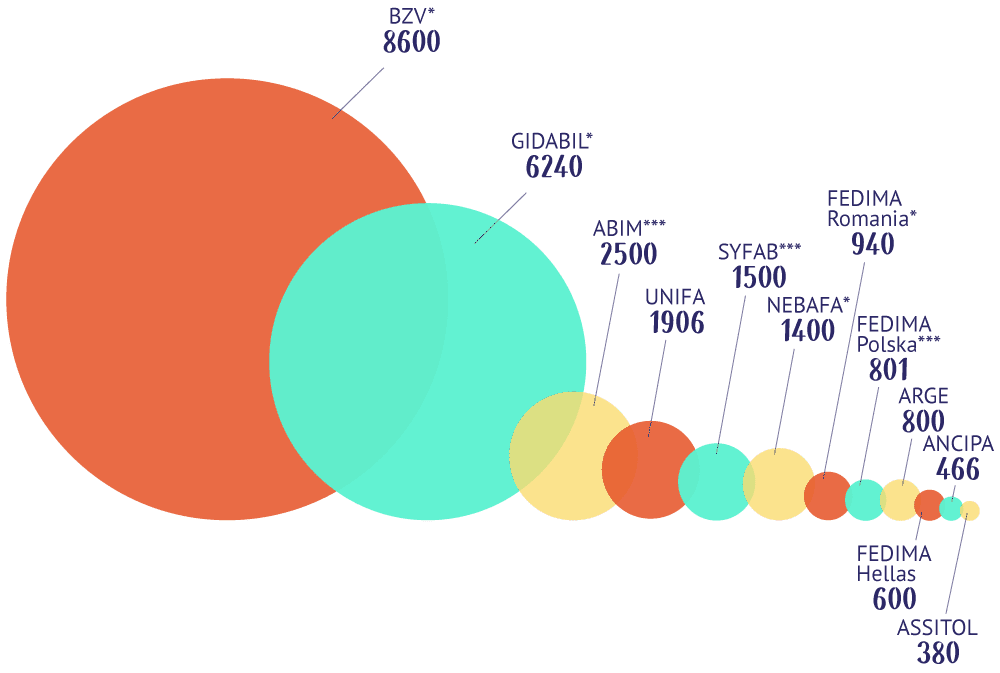
Number of employees of the companies represented by Fedima and the national associations
*2021/2022 data **2018/2019 data ***2018/2019 data
No data available for Fedima España
THE TYPE OF BAKERIES REPRESENTED BY OUR MEMBERS LARGELY VARY BETWEEN NATIONAL ASSOCIATIONS. WHILE OUR DUTCH, AUSTRIAN, BELGIAN, ROMANIAN AND BRITISH ASSOCIATIONS REPRESENT OVER 60% INDUSTRIAL BAKERIES, THE ITALIAN, GREEK AND POLISH ASSOCIATION MOSTLY ACCOUNT FOR ARTISANAL BAKERIES. THE GERMAN AND FRENCH ASSOCIATIONS REPRESENT VARIOUS TYPES OF BAKERIES, INCLUDING ARTISANAL AND INDUSTRIAL BAKERIES.
| Fedima | 6.7 |
|---|---|
| BZV | 1.6* |
| GIDABIL | > 1.4* |
| ABIM | < 0.4*** |
| SYFAB | 0.3*** |
| NEBAFA | 0.4* |
| ARGE | < 0.3 |
| UNIFA | 0.7 |
| ANCIPA | > 0.1 |
| ASSITOL | > 0.1 |
| FEDIMA Hellas | > 0.1 |
| FEDIMA Romania | > 0.1 |
| Fedima España | < 0.1** |
| FEDIMA Polska | < 1.1*** |
Turnover generated by companies represented by FEDIMA (EUR billion)
*2021/2022 data **2020/2021 data ***2018/2019 data
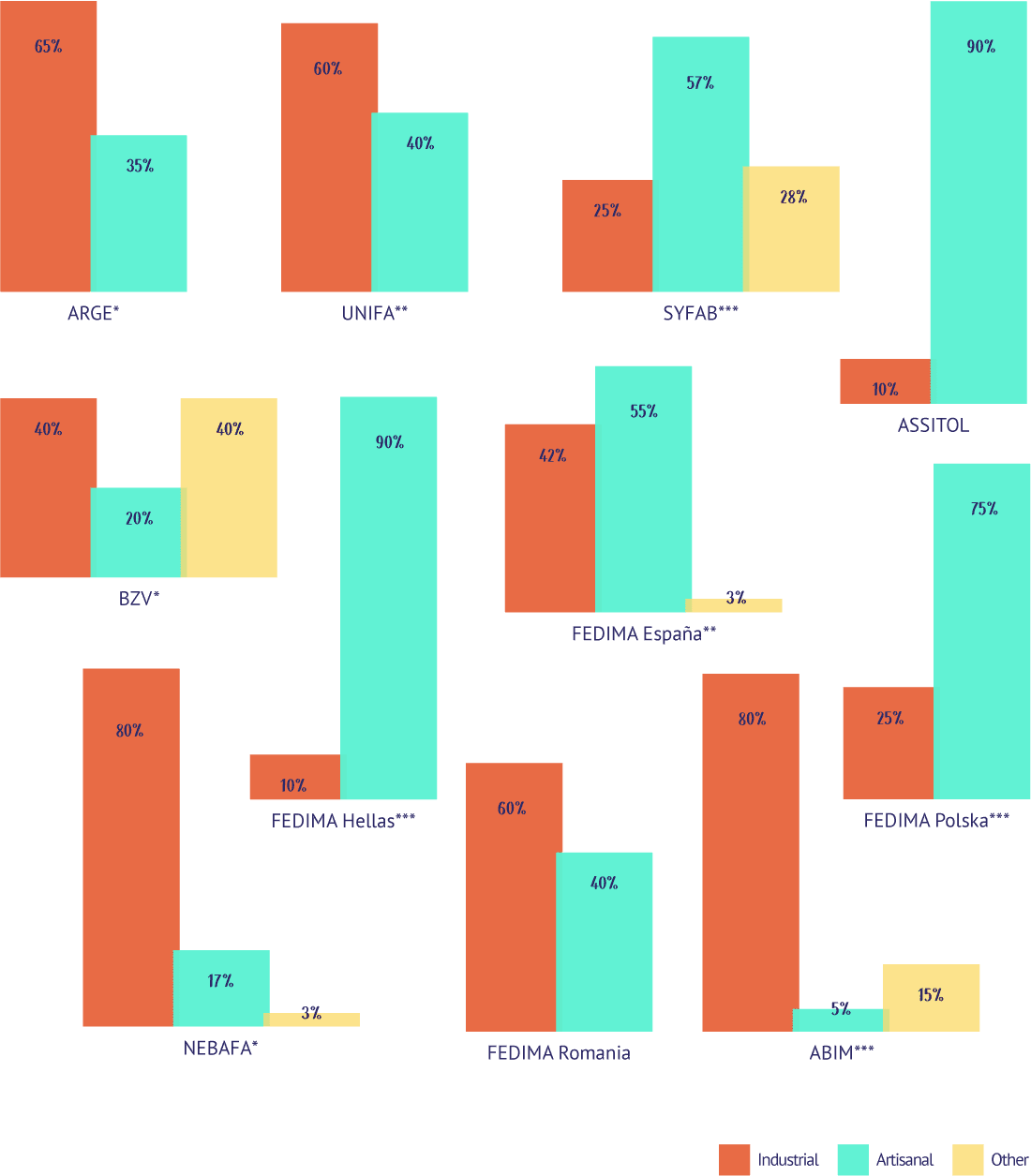
Market share by type of bakery (%)
*2021/2022 data **2018/2019 data ***2018/2019 data
No data available for ANCIPA and GIDABIL: N.A.

Fedima Board Members
- Johan SANDERS, Dawn Foods – President
- Enric VALLS, PURATOS – Vice-President
- Wolfgang MAYER, Backaldrin – Treasurer
- James SLATER, ABIM (UK)
- Thomas LESAFFRE, Lesaffre International
- Christof CRONE, Der Backzutatenverband (Germany)
- Christophe DUCHEZ, SYFAB (France)
- Juan Carlos PUENTE, Zeelandia
- Andrew POLLARD, AB Mauri
- Christian SKULTE, ASSITOL (Italy)
- Peter VERHAGEN, NEBAFA (Netherlands)
Committee Members and Secretariat
Technical Committee
Chair: Sofia MORAIS (Puratos)
There are 5 active Expert Groups (EGs):- EG Ingredients – Chair: Mark VAN MULDERS (Puratos)
- EG Enzymes – Chair: Oliver MAIGRET (Puratos)
- EG Sourdough – Chair: Georg BÖCKER (E. Böcker)
- EG Labelling – Chair: Marlene BIJLSMA (Zeelandia)
- EG Contaminants – Chair: Peter WEEGELS (Sonneveld / OFI)
- The joint AMFEP-FEDIMA WG on Enzymes Safety (AFES) – Chair: Merete SIMONSEN (AMFEP, Novozymes)
- The joint AIBI-AMFEP-FEDIMA WG on Enzymes Labelling (AFA)
- Enzyme labelling TF
- Front-of-Pack Nutrition Labelling (FOPNL) & Nutrient Proiles TF
- Chemicals Strategy for Sustainability (CSS) TF
- Basak ALTINTAS (GIDABIL)
- Antoine CHARDON (SYFAB)
- Marlene BILJSMA (NEBAFA)
- Georg BÖCKER (BZV)
- Igor CALDERARI (ASSITOL)
- Isabelle CHASSEDIEU (SYFAB)
- Carine CHINCHOLLE (BZV)
- Christof CRONE (BZV)
- Nela DRAGOMIR (FEDIMA ROMANIA)
- Massimo FUSARI (ASSITOL)
- Daniela HOBEN (BZV)
- Mirjam KERCKHAERT (NEBAFA)
- Judith KRUISE (DawnFoods)
- Thomas KUNTE (BZV)
- Madeleine LAURIOZ (SYFAB)
- Sophie LION (SYFAB)
- Oliver MAIGRET (UNIFA)
- Matteo NEGRONI (ASSITOL)
- Samantha NOTTAGE (ABIM)
- Indika PATHIRATHNA (ABIM)
- Havva SERTOGLU (GIDABIL)
- Serkan SEVINÇ (GIDABIL)
- Clara SUNYOL (FEDIMA ESPAÑA)
- Mark VAN MULDERS (UNIFA)
- Maarten VAN OORT (NEBAFA),
- Linda VAN ZONSBEEK (NEBAFA)
- Peter WEEGELS (NEBAFA)
Marketing & Communications Committee
Chair: Kris DIERCKX (Zeelandia)
- Bora AKIN (GIDABIL)
- Frédéric AUGER (Lesaffre)
- Sofia BARBOSA (AB Mauri)
- Sarah BROWNER (Dawn Foods)
- Babs BRUIL (NEBAFA)
- Igor CALDERARI (ASSITOL)
- Majella de BRUIJN (Dawn Foods)
- Sole HIJANO (FEDIMA España)
- Ecem IŞIK (Puratos Turkey)
- Philippa KNIGHT (ABIM)
- Sandrine LE BAUD (CSM Ingredients)
- Wolfgang MAYER (Backaldrin)
- Katia MOUVET (Puratos)
- Indika PATHIRATHNA (ABIM)
- Thibaut RENARD (Lesaffre)
- Michael SCHOFIELD (British Bakels)
- Enric VALLS (Puratos)
- Etienne VERHOEF (Sonneveld)
Sustainability Committee
Chair: Jean-Philippe MICHAUX (Puratos)
- Hasan Fatih BINGOL (GIDABIL)
- Tofike CHRIFI (SYFAB)
- Stefano DE DIONIGI (IRCA)
- Sandrine DOBEL (Lesaffre)
- Jo GREENGRASS (ABIM)
- Ibai JIMENEZ (Zeelandia)
- Serpil KIS (GIDABIL)
- Thomas LEITNER (Backaldrin)
- Sylvain LEPLONT (Lesaffre)
- Ophélie ROBLOT (Lesaffre)
- Johannes ROGAAR (Dawn Foods)
- Recep SARPAY (GIDABIL)
- Henri STARON (AB Mauri)
- Catalina SIRBU (ORKLA)
- Carlotta TRUCILLO (ASSITOL)
- Gerlof VAN HOEK (Zeelandia)
Secretariat
- Dirk VAN HAM, Secretary General
- Isabelle DE VINCK, Association Manager
- Agathe VAN DE PLASSCHE, Programme Manager
- Oana IACOB-LE ROY, Policy Officer
- Sybila GALERA, Sustainability Officer
- Meave COSGROVE, Communications & Press Officer
- Nina NAGEL, Communications Officer
- Elena LIVIERO, Communications Officer
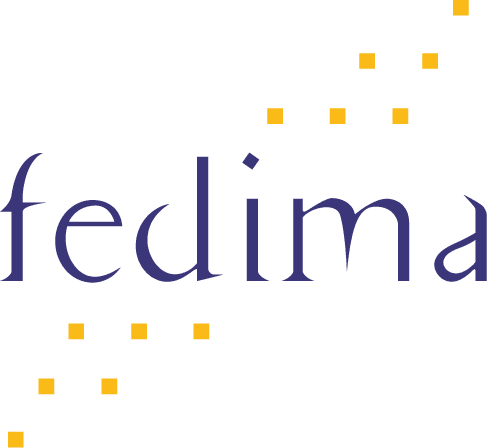
Federation of the European Manufacturers and Suppliers of ingredients to the Bakery, Confectionery and Patisserie Industries ASBL
Rue de la Loi 38, boite 5 - 1000 Brussels, Belgium
Tel.: +32 2 895 43 29 - Email: secretariat@fedima.org
Website: www.fedima.org
EU Transparency register : 904362515084-73
Annual Report 2023 pdf version

